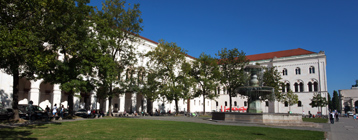About Us
Mathematical Philosophy, i.e. the application of mathematical methods in philosophy, is experiencing a tremendous boom in various areas of philosophy. Mathematical methods are now used not only in epistemology, the philosophy of language, the philosophy of science, and the philosophy of mathematics, but also in ethics, political philosophy and even in the philosophy of religion. The mathematical methods used to tackle problems and questions from these (and other) fields range from various logics and probability theory to modeling and simulation methods that are imported from the natural and social sciences. Indeed, much of the work done at the MCMP can be characterized as approaching philosophical problems and questions in exactly the same way scientists approach their problems.
It is important to note that mathematical philosophers are motivated by the same issues about truth, knowledge, rationality, the nature of objects, and morality – to mention only a few – which have always been driving philosophers. Mathematical methods allow us to state these problems in more precise terms, which typically helps to clarify what is at issue – and at least sometimes definite answers can be given by means of mathematical proofs or models. Interestingly, often new philosophical questions emerge as a result of this, which leads to philosophical progress.
Besides forcing the philosopher to make problems and questions clear and precise, the use of mathematics in philosophy has the additional advantage that it helps to automatically and reliably derive conclusions from philosophical assumptions. This typically happens by writing down proofs or with the help of computers. While in the case of simple sets of assumptions conclusions can also be obtained without the use of mathematics, the mathematical approach allows for the additional consideration of highly complex sets of assumptions. In this way, Mathematical Philosophy helps us to deal with less idealized and more realistic problems and questions – questions that an unaided mind fails to analyze.
Besides the methodological similarities between Mathematical Philosophy and science, there are also many problems that are of common interest. Individual and group rationality is a case in point, where philosophers (and indeed several MCMP-ers) closely interact with social scientists – and there are many other examples. We consider the close connection between philosophy and science to be the best recipe to make progress in philosophy, which is ultimately the goal of the MCMP.






